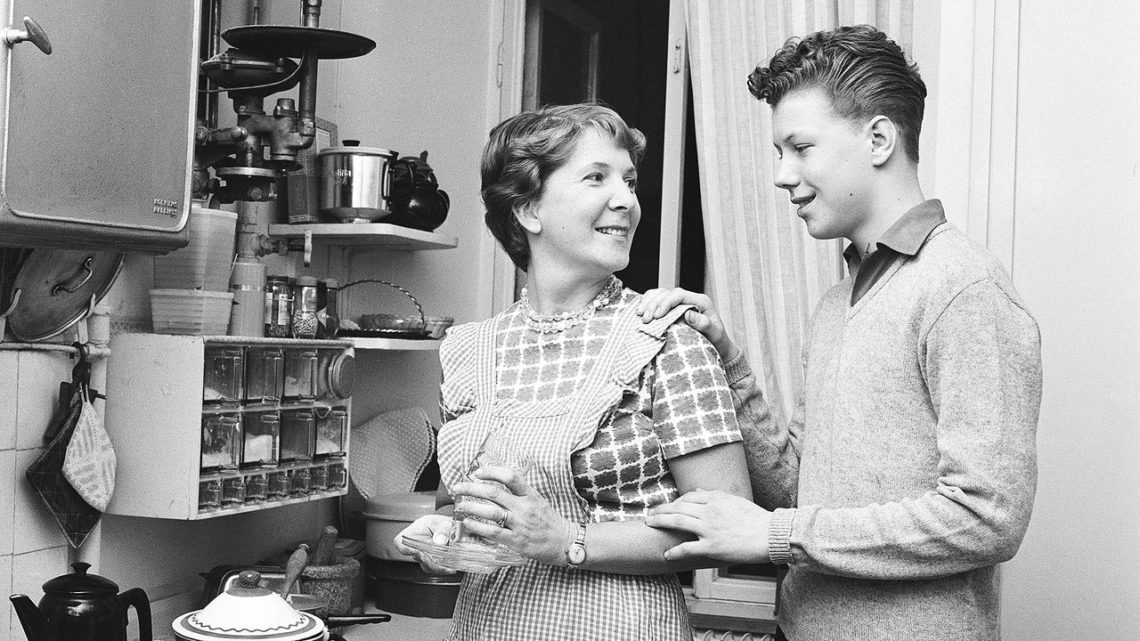When Brendan Liaw, 28, won almost $60,000 on Jeopardy! in May, he also became the face of a new cultural phenomenon when host Ken Jennings introduced him as a stay-at-home son. “It’s a pretty good gig, but I’m worried I’m going to be called a loiterer at some point,” Liaw said.
Also called trad sons, or “hub-sons,” the terms describe an unapologetic generation of young men moving back in with their parents. Think of it as the masculine, muscled counterpoint to the trad-wife trend (without the sourdough starter) and with one very crucial additional detail: They’re entirely unafraid of the label “mama’s boy.”
“I really threw it out there as a little joke; I don’t want to be permanently associated with the face of unemployment forever,” Liaw says, speaking from the University of British Columbia, where he’s gone on to study law. “But I think it’s fun that we get to talk about what it’s like to be a young man, navigating the labor market right now. I think it’s very different than it was for my parents or other people of other generations.”
Until this summer, Liaw lived in the same Richmond townhouse he grew up in, with his childhood bedroom evolving over the years, but his books, desk, and computer staying the same.“I think whatever feelings you have about masculinity, it gets overridden by how expensive everything is,” he says. “I don’t think it’s a mark against your worth.”
According to an analysis published by Rohan Shah, an economics professor at the University of Mississippi, around 1.5 million more adults under 35 live with their parents today than a decade ago—a 6.3% jump. Moving to the big city after graduation has become untenable for many, so Gen Z and millennials are lowering their expectations and settling back into their childhood homes. After all, rising housing prices and inflation have continued to outpace wage gains.
One 26-year-old trad son tells VF that when he got out of a four-year relationship in December, he didn’t want to immediately start searching for a new place. “I was like, you know what? I’ll just go home,” he says. “It was a really good opportunity to spend the time with my parents that I never thought I was going to get to do again in my life.”
The added bonus was, of course, that his mom is “kind of his best friend,” and his dog, Morty, had more people to give him attention. He also contributed to household chores, fixing his parents’ boat, taking out the trash, and bringing in deliveries when they came to the door. He ended up staying for almost 10 months, working from home and spending most of his time developing an app.
A competitive weightlifter, he describes himself as “not too political.” He says that some “trad sons” who live at home stand outside of “normal masculinity,” as he puts it. “Is it because you’re living at home because of the pressure, you can’t go out, and you can’t live your life?” he asks. But in his case, “it’s intelligent; it’s efficient,” he says. “Things happen in your life, and if you’re doing it because you have a good opportunity, kind of like how I was, and it truly is temporary.”
For other trad sons, the decision to move home was less of an afterthought and more of a choice. Take 33-year-old Luke Jonathan Parkhurst, who quit his job as a door-to-door salesman to move in with his mom, Patty, in Las Vegas. “What prompted it is, I just wanted to,” he tells Vanity Fair. “I packed up and moved home and sold my house.”
Patty was entirely supportive of his decision. “We don’t know, especially men, where their mental health is; they’re always taught not to cry, be strong,” she says. “All my kids really did launch early in life, including Luke. If any of them needed a reset, I want to be that person that can be there for them.”
A typical day for Parkhurst as a “hub-son,” the phrase his mom coined in an interview with The New York Post, starts with going to the gym while she walks his dog. He’ll then use her Costco card to get groceries, head home, and cook them lunch. After that, the afternoon agenda consists of lying by the pool, doing the chores, and then watching his nieces and nephews play soccer.
“Even at school, when they would ask what I wanted to be when I was older, I would always write, ‘stay-at-home son,’” Parkhurst says. He used to align with the far right but didn’t vote in the last presidential election. Now he calls himself a “truth seeker,” and believes there is more to fulfilling male values than Republican culture typically promotes.
Republican figureheads like the late Charlie Kirk and JD Vance have called for a return to traditional masculinity, one that centers on family, marriage, and independence. “I want more babies,” Vance said in his first speech as vice president in January, later saying, “I think our culture sends a message to young men that you should suppress every masculine urge,” at this year’s CPAC.
“When it comes to building a home or running heavy equipment or farming or anything like that, I think I could outperform them,” Parkhurst says. “When they talk about, Hey, this is what a man’s supposed to do, I’m not saying they’re incorrect, but I have different perspectives on what I think a man should do as well.”
For Parkhurst, much of this revolves around going to the gym, being able to fix things around the house, and caring for his mother.
“I think as men or humans it is in our innate nature to progress or provide, and it seems like a step away from that,” his close friend, Tyler Jackson, tells VF. “But I love Luke regardless; he has a heart of gold and would do anything for his family.”
Parkhurst, like other trad sons, has taken to documenting his day-to-day activities on social media. Sometimes he’ll post videos of his grandma, and other times, of him backflipping off the roof of one of his mom’s rental properties.
Other TikTok users, like Ethan Lovell, use the format “my job today as a SAHS,” filming himself arranging flowers against the backdrop of a gorgeous kitchen. Another creator, Shaavir Noorani, in a video with almost half a million views, invites his viewers to “come and spend the day with me as a 28-year-old stay-at-home son,” while he makes coffee, unboxes packages of clothes, and walks down an elaborate, marbled staircase in what must be his childhood home.
TikTok content
While their mothers may be delighted by the return of their sons, the men themselves are busy fending off accusations of ick-like behavior. On Fox News, Laura Ingraham called them “men in decline,” while Tomi Lahren warned of “the feminization of men.” Even the trad wives, it seems, are unamused by the trend.
“There’s a reason that most women would think the idea of a trad son would be unattractive, undesirable, or not respectable,” said Janea Elizabeth, a content creator who promotes the trad lifestyle to her over 100,000 Instagram followers. “We naturally want leaders, providers, and capable men outside of the home.”
But for another trad wife Gubba Homestead, as she is known to her 2 million followers, “Stay-at-home-sons isn’t a cultural regression; it’s a revival.”
“Kick your son out at 18 and the world raises him,” she tells me over the phone. “Keep him home with purpose, and a family raises a man.”
More Great Stories From Vanity Fair
-
What Bari Weiss Means for 60 Minutes
-
All About Melania
-
Meet the British ’90s It Girl Who Wants to Make England Great Again
-
Anjelica Huston’s Cultured Coolness
-
Gore Vidal’s Final Feud
-
The 6 Grisly Films Inspired by Serial Killer Ed Gein
-
Charlie Kirk, Redeemed by the Media
-
The 25 Best Movies to Watch on Netflix This October
-
From the Archive: The Hollywood Secret Katharine Hepburn Helped Bury
The post Trad Wives, Move Over. Trad Sons Are the New Homesteading Influencers. appeared first on Vanity Fair.




